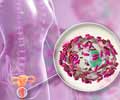Researchers from the Polytechnic University of Catalonia have found a bacterium in Bolivia (the largest continuous salt desert in the world) that stores large amounts of PHB, a prized polymer.

In the quest for natural polymers to substitute for petroleum-based plastics, scientists have recently discovered that a microorganism in South America produces poly-beta-hydroxybutyrate (PHB), a biodegradable compound of great utility for the food, pharmaceutical, cosmetic and packaging industries.
The bacterium in question is Bacillus megaterium Uyuni S29, a strain that produces the largest amount of polymer of the genus. It has been found in the water 'eyes' of the famous Salar de Uyuni or Uyuni salt flat, in Bolivia.
"These are very extreme environments, which facilitate intracellular accumulation of PHB, a reserve material used by bacteria in times when nutrients are scarce," Dr Marisol Marqués, microbiologist at the Polytechnic University of Catalonia (UPC, Spain), explains to SINC.
Scientists from the UPC and the Graz University of Technology in Austria have successfully made the bacillus produce significant quantities of the compound in the laboratory in cultivation conditions similar to those used in industry. The technique is published in the journals Food Technology & Biotechnology and Journal of Applied Microbiology.
"The resulting biopolymer has thermal properties different from conventional PHBs, which makes it easier to process, independently of its application," Marqués goes on.
Advertisement
The team has managed to reduce PHB's high molecular weight for the first time, using lipase enzymes, which break up fats, as well as using the biopolymer to form nano- and microspheres loaded with antibiotic to control their spread throughout the organism.
Advertisement
Source-Eurekalert












